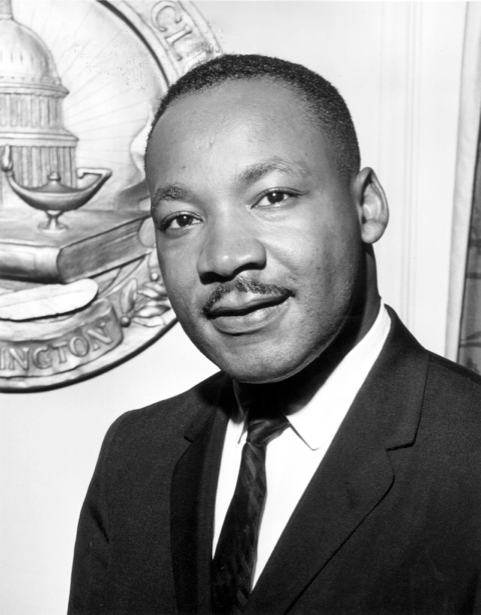This Month in National Press Club history: MLK visits Club
Dip down anywhere in the National Press Club’s 117-year history and we find remarkable stories about events at our Club that contributed to American, world and social history. The Club’s History and Heritage team is highlighting just a few each month so our members can appreciate the role the Club has played for well over a century as the place where news happens. Here are a few from July.
July 19, 1962: Dr. Martin Luther King, Jr’s historic Club speech
About a year before his famous “I Have a Dream” speech during the March on Washington, Dr. Martin Luther King, Jr. became the first African-American to address a Club luncheon forum.
He came to the Club fresh from a protest at Albany, Ga., where he had been jailed for his part in leading the civil rights protests to end legal segregation and demand voting rights.

As leader of. the Southern Christian Leadership Conference, King defended his non-violent approach to protest, saying it disarms his opponents by making it possible “to struggle to secure moral ends through moral means.” Making the distinction between just and unjust laws, he said, “We are not practicing anarchy. We are merely saying there are some unjust laws, and the only way to call this to the attention of the community is to break them and to suffer the penalty by staying in jail if necessary.”
In 2016, the History and Heritage team noted that the text of King’s speech had been forgotten. It obtained the audio recording, transcribed it and found a minute-and-a-half video from that event. It organized a panel of civil rights leaders to hear portions of the speech and talk about their significance to the civil rights movement.
That led to placing a historic marker outside the ballroom.
King was scheduled to appear again at the Club on April 9, 1968, but rather was buried that day following his assassination on April 4.
July 17, 2003: President Ford’s last appearance.
Gerald Ford had spoken to the Club while he was a House member, president, and after his presidency. With a total of 15 appearances, Ford still holds the record for addressing the number of luncheons. He had appeared annually since leaving office to present the Gerald Ford awards on reporting on the presidency and on defense reporting. It has been said he was the only president who sincerely liked reporters.
On this last occasion, at the age of 90, Ford presented White House awards to Bob Woodward and Dan Balz of the Washington Post and to Greg Jaffe of the Wall Street Journal.
In accepting the award, Woodward said that he originally thought Ford’s pardoning Nixon had been terrible. But in retrospect, he said, turning to Ford, he now believed it was the best thing for the nation.
July 26, 2018: Freedom for Emilio Guitierrez
Emilio Guitierrez, a Mexican journalist, had fled to the United States as he feared for his life following a series of stories he wrote exposing corruption in the Mexican military. For more than a decade, he had lived in the United States under refugee status. In 2017, the Club conferred on him its International Freedom of the Press Award, not for his work alone but for all of the Mexican journalists who have risked harassment and death to report on corruption in the Mexican government and the power on the drug lords.
Just six weeks later, when Guitierrez and his son went to El Paso for what they thought would be a routine extension of their asylum, Immigration and Customs Enforcement officials told them they were to be deported that day. His Press Club talk had given his adversaries to Mexico new impetus to silence him. Fortunately, the Board of Immigration Appeals acted quickly to stay the order, but Emilio and his son stayed in custody.
The Club immediately embraced Emilio’s cause, organizing press conferences where Emilio could speak by phone to reporters, attorneys and press freedom advocates. Working with other press freedom groups, the Club kept up the pressure, gathering more than 100,000 signatures demanding Emilio’s release.
Bill McCarren, who was the Club’s executive director at the time, flew to El Paso to rally support. ICE officials told him to “tone it down.”
On July 11, a federal judge challenged Emilio’s detention, saying there was plenty of evidence that ICE had violated his First Amendment rights and cited the “tone it down” statement. Instead of waiting for further legal action, ICE freed Emilio and his son on July 26.
